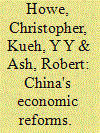| Srl | Item |
| 1 |
ID:
046284


|
|
|
|
|
| Publication |
London, routledgeCurzon, 2003.
|
| Description |
xii, 404p.
|
| Standard Number |
0700713557
|
|
|
|
|
|
|
|
|
|
|
|
Copies: C:1/I:0,R:0,Q:0
Circulation
| Accession# | Call# | Current Location | Status | Policy | Location |
| 046276 | 338.951/HOW 046276 | Main | On Shelf | General | |
|
|
|
|
| 2 |
ID:
016715


|
|
|
|
|
| Publication |
Dec 1993.
|
| Description |
711-745
|
|
|
|
|
|
|
|
|
|
|
|
|
|
|
|
| 3 |
ID:
074820


|
|
|
|
|
| Publication |
2006.
|
| Summary/Abstract |
Accelerated agricultural collectivization in China was an inescapable consequence of the broader economic goal of socialist industrialization. Rightly or wrongly, this wider vision of China's future was imposed by Mao, and to judge the High Tide of agricultural collectivization of 1955-56 without regard to these wider objectives is a mistake. The collectivization represented an extensive growth that relied on labour mobilization to expand factor supply and to extend the crop sown area in a manner rationalized by the theories of Ragnar Nurkse. This strategy inevitably required bureaucratic control and coercion, depressed peasant consumption and the forced siphoning off of the agricultural surplus. As such its outcome should not be evaluated in terms of the neoclassical economic norms of income maximization, peasant incentives or efficiency in cropping patterns based on market prices.
In this framework, the post-Mao decollectivization and the readjustment of the agriculture-industry balance can be seen as a transition to an intensive agricultural growth strategy that was built upon the precise material legacy (expanded irrigation and drainage capacity) left behind by Mao. This strategy has proved to be remarkably successful in further releasing industrial growth from the agricultural constraint.
|
|
|
|
|
|
|
|
|
|
|
|
|
|
|
|